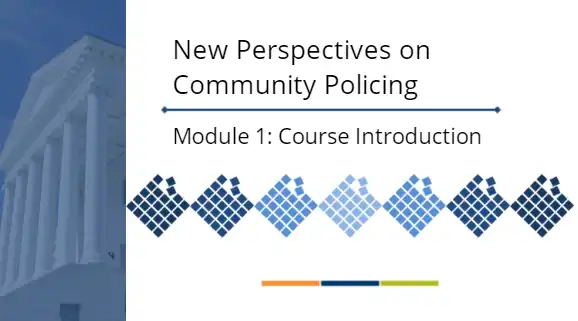New Perspectives on Community Policing
Enrollment options
Providing an overview of the dramatic shifts and challenges faced by law enforcement agencies and the communities they serve, the course also offers problem-solving tools, examples of successful police and community partnerships, and numerous community-policing resources.
New Perspectives on Community Policing, a flexible, interactive, and relevant course, provides an outstanding opportunity for learners to gain new insights on community policing and its role in today's complex world.
Learning Objectives:
- Define new and emerging communities
- Identify community dynamics and structures related to new and emerging communities
- Explain the implications that new and emerging communities have on policing
- Define new and emerging organizational challenges facing law enforcement agencies
- Identify the implications that organizational change may have on law enforcement agency functions and capacities
- Identify strategies and philosophies that may simultaneously promote successful organizational transformation and the practice of community oriented policing
- Identify several emerging issues which impact community policing
- Explain non-traditional threats to the community through examples of crimes and disorder
- Explain the importance of community partnerships and problem solving elements of the Community Policing Principles as they pertain to issues and threats
- Identify the fundamentals of community policing and how they apply to change management
- Identify the role of perspective in proactive problem solving
- Apply R.O.A.R. to the module’s interactive exercise
Target Audience: Law enforcement, criminal justice professionals, and other community stakeholders.
Cooperative Partners: This tuition-free online training was developed in joint partnership between the National Center for Policing Innovation (NCPI), formerly known as Virginia Center for Policing Innovation, and the Western Community Policing Institute (WCPI) and was originally supported by cooperative agreement 2008-CK-WXK-003 by the U.S. Department of Justice, Office of Community Oriented Policing Services (COPS).
Learning Hours: 4 hours including the pre-test and post-test.

